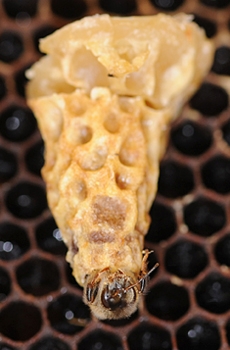
The story was not about a red light district or "Ladies of the Night" or even linked to humans.
It was about honey bee queens. "Ladies of the Day," if you will.
The story that raised a few eyebrows involved research titled "Characterization of the Active Microbiotas Associated with Honey Bees Reveals Healthier and Broader Communities when Colonies are Genetically Diverse," published March 12 in the PLOs One Journal.
A team headed by researchers at Wellesley (Mass.) College found that "Colonies with genetically diverse populations of workers, a result of the highly promiscuous mating behavior of queens, benefited from greater microbial diversity, reduced pathogen loads, and increased abundance of putatively helpful bacteria, particularly species from the potentially probiotic genus Bifidobacterium."
Scientists and beekeepers know that a virgin queen, on her maiden flight, will mate with 12 to 25 or more drones gathered in the drone congregration area. It's not immoral; it's just what happens.
The drones mate and then they die. All of them. Or as Extension apiculturist Eric Mussen of the UC Davis Department of Entomology tells bee associations: "They die happy, with a smile on their face."
The queen returns to her hive and begins laying eggs, up to 2000 a day in peak season. She'll have enough sperm for the rest of her life, which is usually around two to three years.
This scientific research in the PLoS One Journal is important in that it has led to increased interest in microbial communities and hope for the declining bee population.
Bee breeder-geneticist Susan Cobey of UC Davis and Washington State University has advocated genetic bee diversity for years.
"The primary perceived problem for beekeepers is a diminished quality of queens, and recent survey results from beekeeping operations in the U.S confirm this view," she and her colleagues write in a chapter of the newly published Honey Bee Colony Health: Challenges and Sustainable Solutions.
Beekeepers have long complained of "poor queens."
Cobey and co-chapter authors Walter "Steve" Sheppard of WSU and Dave Tarpy of North Carolina State University write: "The poor queens category encompasses many different problems but most of these reports document premature supersedure (queen replacement), inconsistent brood patterns, early drone laying (indicative of sperm depletion), and failed requeening as indicative of low queen quality."
So the next time you see a headline screaming "immoral" honey bee queens, it was probably written by someone who has no clue about honey bee reproduction.
Or someone trying to be funny...
Attached Images:

Queen and her court. (Photo by Kathy Keatley Garvey)